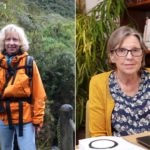Two pioneers fighting against species extinction receive the Frontiers of Knowledge Award
Gretchen Daily and Georgina Mace have been recognized with the BBVA Foundation Frontiers of Knowledge Award in the category of Ecology and Conservation Biology for their visionary work combating the loss of species. They have developed tools that are invaluable for quantifying "nature’s value" thus facilitating science-based policies in support of the conservation of species. The jury panel commended not only their efforts in identifying the problem, but also their involvement in finding solutions.

The ecologists have conducted their research in parallel terrains, but have never worked together; still, their impact on global conservation has been strongly synergistic. The selection committee stressed that the two scientists "have led the process of documenting the alarming loss of global biodiversity in the planet’s sixth extinction crisis."
Redefining the Red List
Georgina Mace (London, 1953) has been lauded for her work in establishing the quantitative scientific criteria used to assign species to the list of threatened species, known as the Red List, which is produced by the International Union for Conservation of Nature.
"The good news is that all the analyses suggest we have the scientific tools necessary to reverse the current biodiversity crisis"
The Red List was started in the 1960s and was based on the subjective recommendations of experts. Mace coordinated the effort to determine objective ecological parameters that indicate a relatively high risk of extinction, including factors such as population size, rate at which the population is declining, area of distribution, and the extent to which the area is fragmented. The list, which currently contains information about 90,000 species, is widely used to put effective measures and conservation policies in place.
"One of the reasons that we worry about species going extinct is that the wellbeing of many people worldwide depends on having natural communities of species," Mace stated after learning she had been honored with the award. She continued to state that without the wealth of species "human societies would definitely lose out on benefits that we now take for granted."

Gretchen Daily and Georgina Mace, BBVA Foundation Frontiers of Knowledge Award - BBVA Foundation
Factoring nature into the equation
After her work on the Red List, Mace focused her research on the concept of "ecosystem services," the area where the interests of the two scientists squarely overlap. Gretchen Daily (Washington, D.C., 1964) has turned the concept of ecosystem services into the basis of an innovative software tool for conservation decision-making.
InVEST (acronym for Integrated Valuation of Ecosystem Services and Trade-offs) is a tool that helps quantify the value of the services ecosystems provide. It is now used in organizations in 185 countries. An example of InVEST in action can be found in China, where the tool has been used in the reforestation efforts that followed severe flooding in the 1980s.
"A key question is how we can switch over to inclusive, green development, so that we secure people and nature and create a future in which the two can thrive," Daily commented.
Optimism in the face of crisis
Daily and Mace are equally strident in their warnings about the seriousness of the current biodiversity crisis. "Over the course of human history, we have gradually eroded both the diversity and the abundance of all the rest of life on Earth; the loss of species is continuing, with no evidence that it has slowed, so we do need to act on it," says Mace.
Daily expresses her agreement, "We are destroying so much of nature that we are on a suicidal course. We have to recognize the role of nature in sustaining life, before it is too late."
Despite the gravity of the current situation, the award winners share an optimistic view of the future: "Conserving world nature is not a luxury, it is a necessity," says Mace. "People have developed and evolved by building an intimate relationship with nature, and it is not at all clear that we can survive and thrive on a changing planet unless we take that relationship seriously. The good news is that all the analyses suggest we have the scientific tools necessary to reverse the current biodiversity crisis."
"We all, as individuals and a society, depend utterly on nature for almost every aspect of our survival, wellbeing, and happiness," explains Daily. "If we consider what Earth looks like from outer space, it’s that tiny blueish sphere in the deep black cosmos. It’s the only place we know of with life, and it’s life that has created the conditions that allow people to thrive."